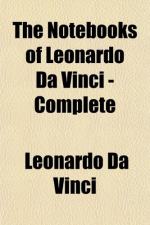The watery element was left enclosed between the raised banks of the rivers, and the sea was seen between the uplifted earth and the surrounding air which has to envelope and enclose the complicated machine of the earth, and whose mass, standing between the water and the element of fire, remained much restricted and deprived of its indispensable moisture; the rivers will be deprived of their waters, the fruitful earth will put forth no more her light verdure; the fields will no more be decked with waving corn; all the animals, finding no fresh grass for pasture, will die and food will then be lacking to the lions and wolves and other beasts of prey, and to men who after many efforts will be compelled to abandon their life, and the human race will die out. In this way the fertile and fruitful earth will remain deserted, arid and sterile from the water being shut up in its interior, and from the activity of nature it will continue a little time to increase until the cold and subtle air being gone, it will be forced to end with the element of fire; and then its surface will be left burnt up to cinder and this will be the end of all terrestrial nature. [Footnote: Compare No. 1339, written on the same sheet.]
1219.
Why did nature not ordain that one animal should not live by the death of another? Nature, being inconstant and taking pleasure in creating and making constantly new lives and forms, because she knows that her terrestrial materials become thereby augmented, is more ready and more swift in her creating, than time in his destruction; and so she has ordained that many animals shall be food for others. Nay, this not satisfying her desire, to the same end she frequently sends forth certain poisonous and pestilential vapours upon the vast increase and congregation of animals; and most of all upon men, who increase vastly because other animals do not feed upon them; and, the causes being removed, the effects would not follow. This earth therefore seeks to lose its life, desiring only continual reproduction; and as, by the argument you bring forward and demonstrate, like effects always follow like causes, animals are the image of the world.
XX.
Humorous Writings.
Just as Michaelangelo’s occasional poems reflect his private life as well as the general disposition of his mind, we may find in the writings collected in this section, the transcript of Leonardo’s fanciful nature, and we should probably not be far wrong in assuming, that he himself had recited these fables in the company of his friends or at the court festivals of princes and patrons. Era tanto piacevole nella conversazione— so relates Vasari—che tirava a se gli animi delle genti. And Paulus Jovius says in his short biography of the artist: Fuit ingenio valde comi, nitido, liberali, vultu autem longe venustissimo, et cum elegantiae omnis deliciarumque maxime theatralium mirificus inventor ac arbiter esset,




